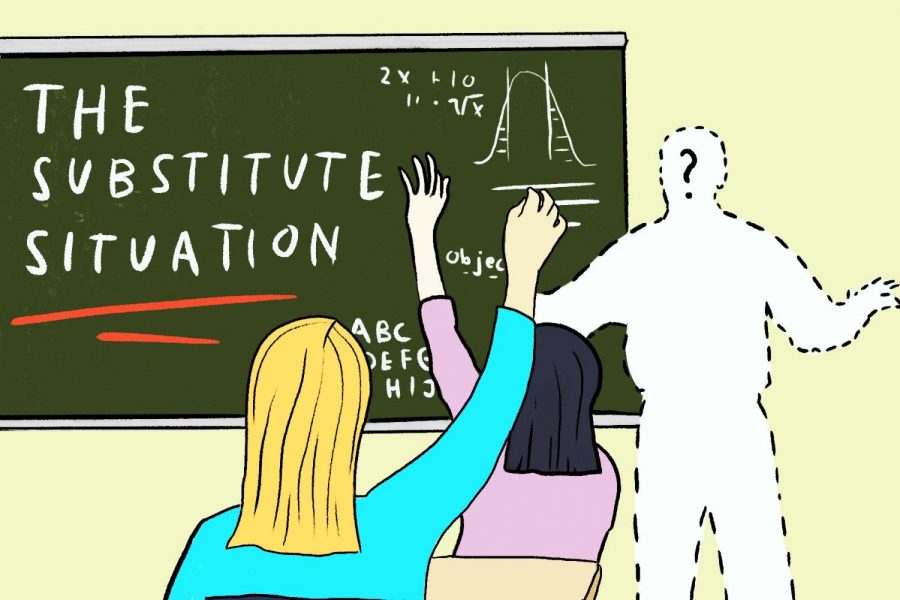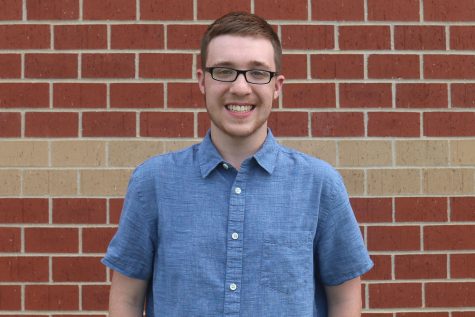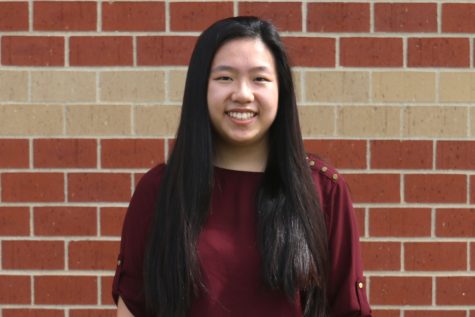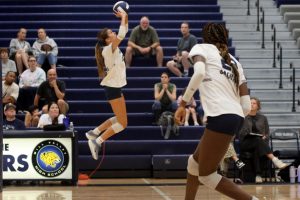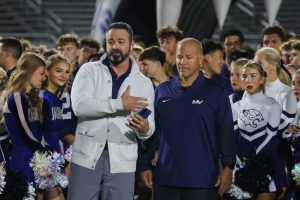District struggles to address substitute teacher shortages
The lack of substitutes in Kansas has been a statewide issue for years, and COVID-19 exacerbated its challenges
December 21, 2020
With COVID-19 cases continuing to increase and the district deciding to temporarily switch to the remote learning model, one factor pushed the district in that direction: the lack of available substitutes. While the education system is no stranger to teacher shortages, between qualities, safety fears and age concerns, finding substitutes this year has become more difficult.
One person tasked with finding more substitutes is Carrie Handy, the Director of Human Resources for Elementary Personnel for the district. She feels that COVID-19 has made it much harder to have available staff members this school year.
“The most recent surge in the community spread of COVID-19 in Johnson County impacted school staff as evidenced by the substantial increase in the number of staff quarantines and isolations toward the end of October and through the months of November and December,” Handy said. “This issue was compounded by the limited availability of substitute teachers.”
While assistant superintendent Alvie Cater feels the decision to move from the hybrid learning model to the fully remote model was based primarily on the increase in COVID-19 cases, the lack of available substitutes was a factor considered in the discussion.
At a state level, Mischel Miller, Director of Teacher Licensure and Accreditation at the Kansas State Department of Education, feels this problem with staff shortages is not a new occurrence. Instead, the pandemic resulted in an increase of staff shortages that were already present in previous years.
“We were struggling prior to the pandemic with having enough teachers to fill all of the positions in Kansas, about 600 positions last year during the 2019-2020 school year,” Miller said. “So now we’re in 2021. We will have that 600 plus I’m guessing a few more because of the pandemic. So, the need is there in all areas.”
To combat that need, Miller has seen more people willing to become substitutes.
“We actually have 1,000 more sub applications right now than we did in October,” Miller said ”Now in early December, we have 1,000 more sub applications than we might normally have in any given year. People in our communities have stepped up.”
Director of Secondary Personnel Brain Schwanz has also seen an increase in the number of available substitutes at the local level.
“We have already seen some increases since November with the number of substitutes through Morgan Hunter, the company that we partner with to provide our substitute teachers,” Schwanz said. “We have also seen an increase in the number of subs willing to accept available jobs in the district.”
While Miller is happy to have the needed substitutes, she is more focused on filling teaching vacancies with actual teachers.
“I’m guessing you’d really rather have a full time teacher instead of a substitute,” Miller said. “So, while folks are super helpful when we’re in this situation, we still have a shortage of highly qualified teachers to fill positions.”
With substitutes getting increased hours of work during the pandemic, Miller is hoping that many of them will come back, potentially as full-time teachers.
Miller believes the lack of available substitutes originates from the lack of teachers in the state of Kansas.
“It is really hard to find great math and science teachers that can go make more money in the private world,” Miller said. “We are short teachers everywhere: third grade math, science, English Language Arts at the high school [level], middle school reading, band, choir and debate. We’re short [teachers and substitutes] everywhere.”
Even though he enjoys substituting for the district, Mike Riss, a substitute of eight years, made the decision to temporarily stop being a substitute to help protect his family.
“I told Dr. Holder that I would not be able to do it anymore,” Riss said. “I was a little scared, and my kids were more scared, especially my daughter because she is pregnant. My wife’s mom is elderly and a cancer survivor and we like to help her. [Subbing] would mean I wouldn’t be able to do that. So I just decided that was best for the rest of the year, so I haven’t been subbing since the first of the year.”
Teaching in the online learning model last semester, Riss observed how difficult it was for both students and teachers.
“Everybody’s frustrated. It’s not the main reason that is causing me not to sub, but I definitely would put it as one of the reasons why I don’t want to sub,” Riss said. It’s very difficult to teach online, especially on the remote days where I had like 30 kids in the class, two screens on my computer. How do I monitor them? How do I make sure they’re in it. It was very difficult.”
Despite online many aspects of teaching being a challenge, Riss didn’t have a problem with Zoom.
“I don’t have too much trouble,” Riss said. “I figured out how to take attendance … before that first day started. People had figured that out so I didn’t have too many difficulties with Zoom. I knew how to screen share. I had a freshman in a drama class that had his head down on the stairs while I was giving out information, and I privately chatted with them.”
The biggest problem Riss has seen with online learning is the accountability.
“The technology was not a problem, it’s monitoring the students,” Riss said. “From what I was doing, it was it was pretty much impossible. I wasn’t doing very good.”
To help encourage substitutes like Riss to return, Handy and the district are focused on safety and training.
“In addition to publicizing the opportunity to be a substitute teacher, we regularly review pay rates for substitutes in the region to ensure the district offers a competitive wage.” Handy said. “Additionally, we make sure all subs are provided training in our organization’s systems. Lastly, we ensure all substitute teachers are provided with necessary personal protective equipment in order to feel safe while serving in our schools.”
With an already streamlined process, Schwanz has attempted to publicize the simplicity of becoming a substitute.
“The requirements to become a sub have not changed because of COVID-19,” Schwanz said. “Interested substitute teaching applicants are required to have a minimum of 60 college credit hours to apply for a substitute teaching license in Kansas. Additionally, they must pay an application fee to the state, submit their fingerprints, and have a background check completed prior to being hired.”
In addition to district initiatives to get more substitutes, Miller and the Kansas Department of Education have made it easier to fill classroom vacancies.
“Kansas limits in normal circumstances the number of days that those substitutes can serve in any one classroom,” Miller said. “We lifted that requirement during the pandemic and just said ‘find a substitute who has the license, use them in any way.’ That’s the only kind of adjustment that we’ve made.”
“I’m hopeful these folks who have taken the opportunity to do this will consider staying and will consider renewing [their license],” Miller said. “It’s a one year license when you first apply that they will consider renewing that and continuing to be supportive. That’s what I’m hopeful of and I think that they will and I think that will continue.”
For Cater, help from community members has been vital to keeping the school running.
“We are pleased to share that we have seen an increase in our available substitute teacher pool over the last few weeks,” Cater said “We are grateful to the parents and community members who took steps to become substitutes during this time. Because our secondary schools shifted to remote learning on Nov. 30, the district has been able to better manage the need for substitute teachers.”
With all the uncertainty of the year, Miller feels that patience and forgiveness are important traits to emphasize.
“I really do think there is an amount of patience and forgiveness that we need to give teachers who are working so hard right and doing the very best that they can,” Miller said. “The only advice I would have is to have a great deal of patience and understanding. This time will pass but we just have to practice our patience.”


